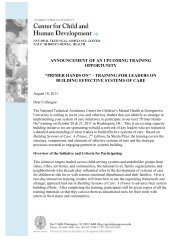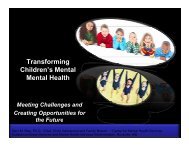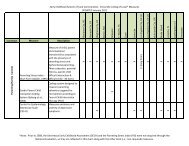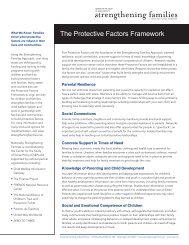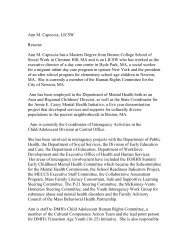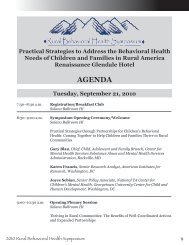Training Institutes 2012 - National Technical Assistance Center for ...
Training Institutes 2012 - National Technical Assistance Center for ...
Training Institutes 2012 - National Technical Assistance Center for ...
Create successful ePaper yourself
Turn your PDF publications into a flip-book with our unique Google optimized e-Paper software.
• Quality improvement processes including the quality improvement continuum, what the dashboard is telling you, and<br />
how to create meaningful action plans that address the root cause of an issue<br />
Participants will have an opportunity to engage in dialogue as well as interactive activities. The faculty team will offer<br />
the perspectives of a county commissioner of mental health, a clinical supervisor, a director of research and evaluation,<br />
and a quality improvement specialist.<br />
MODERATOR/PRESENTER: Heidi Milch, L.M.S.W., Executive Director, Community Connections of New York,<br />
Buffalo, NY<br />
Brian Pagkos, Ph.D., L.M.S.W., Director of Research and Evaluation, Community Connections of New York, Buffalo, NY<br />
Marie Sly, Coordinator, Children & Youth Services Integration, Erie County Department of Mental Health, Buffalo, NY<br />
Sarah Taylor, Director of Care Coordination, New Directions Youth and Family Services, Amherst, NY<br />
RESOURCE PERSON: Philip Endress, M.A., Commissioner, Erie County Department of Mental Health, Buffalo, NY<br />
INSTITUTE #15 1:30 PM THURSDAY • 8:30 AM SATURDAY • OSCEOLA 3-4<br />
How to Improve the Outcomes of Evidence-Based Treatments Using the Contextualized<br />
Feedback System<br />
OBJECTIVES—Participants will learn:<br />
1. How to improve the quality and effectiveness of their services <strong>for</strong> youth and families<br />
2. To integrate client and caregiver feedback into specific treatment decisions<br />
3. To describe how to implement and maintain the Contextualized Feedback System (CFS) in child, youth, and adult<br />
mental health services<br />
4. How to integrate clinically relevant measures of treatment progress and outcome into the everyday operation of a<br />
service delivery system in multiple service settings<br />
5. To describe how CFS can enhance the outcomes of other evidence-based treatments, specifically with Functional<br />
Family Therapy<br />
6. To examine implementation issues and barriers in changing organizations and clinician behavior and suggested<br />
strategies <strong>for</strong> overcoming these problems<br />
This Institute will focus how service providers <strong>for</strong> youth with behavioral and emotional problems can improve clinical<br />
outcomes, better integrate specific services into complex service systems, and provide methods <strong>for</strong> relevant and feasible<br />
local evaluation using Contextualized Feedback Systems (CFS tm ). CFS is a quality improvement tool that assists clinicians<br />
and supervisors in assessing change as a client progresses in treatment. It is a web-based measurement system that<br />
integrates real-time clinical feedback on treatment progress and process as reported by the clinician, client, and other<br />
respondents (e.g., caregivers). CFS is designed to assist in organizational change by sustaining a continuous learning<br />
environment, and encouraging and facilitating the appropriate use of empirically supported mental health interventions.<br />
CFS is now in its third version and is being used in multiple agencies across different disciplines and settings. The<br />
effectiveness of CFS to improve client outcomes has been demonstrated in a randomized experiment conducted in 28 sites.<br />
Faculty will also highlight an innovation combining CFS with implementation of another evidence-based treatment. By<br />
systematically monitoring the process and outcomes of mental health practices in community-based settings, CFS<br />
provides an approach to continuous quality improvement. Functional Family Therapy will be presented as an example of<br />
how CFS can improve outcomes with evidence-based practices.<br />
Specific topics to be covered include:<br />
• How the use of CFS can improve client outcomes and clinician productivity<br />
• Use of clinically relevant progress measures in various treatment settings<br />
• How the CFS provides a “voice” <strong>for</strong> youth and caregivers in documenting their perceptions of treatment<br />
progress and process<br />
• How the CFS can provide a tool <strong>for</strong> clinicians and supervisors to obtain feedback to in<strong>for</strong>m the provision<br />
of mental health services<br />
<strong>Training</strong> <strong>Institutes</strong> <strong>2012</strong><br />
INSTITUTES<br />
47



